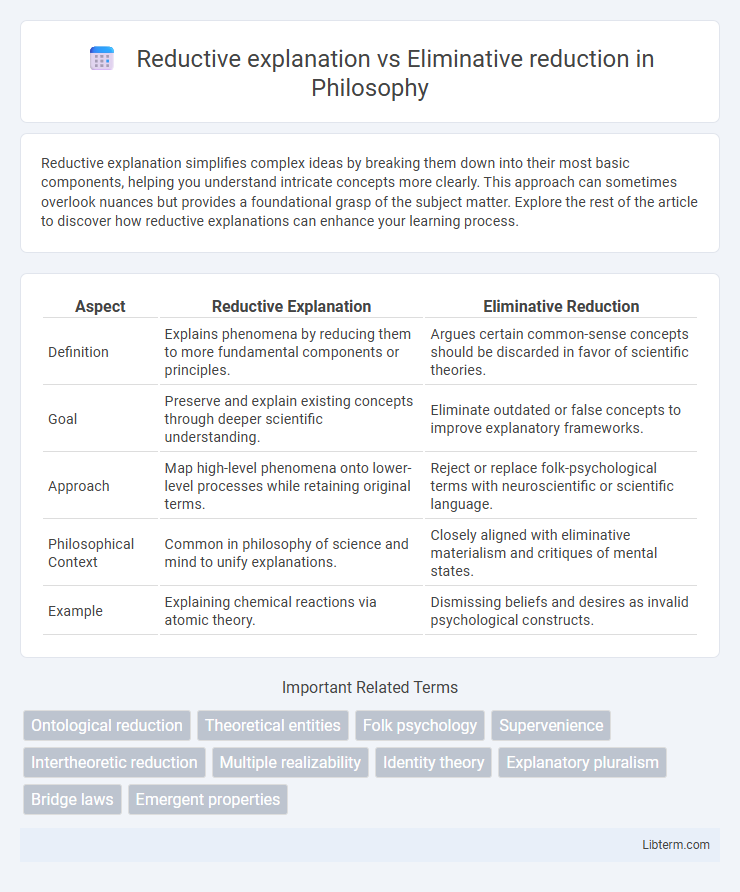Reductive explanation simplifies complex ideas by breaking them down into their most basic components, helping you understand intricate concepts more clearly. This approach can sometimes overlook nuances but provides a foundational grasp of the subject matter. Explore the rest of the article to discover how reductive explanations can enhance your learning process.
Table of Comparison
| Aspect | Reductive Explanation | Eliminative Reduction |
|---|---|---|
| Definition | Explains phenomena by reducing them to more fundamental components or principles. | Argues certain common-sense concepts should be discarded in favor of scientific theories. |
| Goal | Preserve and explain existing concepts through deeper scientific understanding. | Eliminate outdated or false concepts to improve explanatory frameworks. |
| Approach | Map high-level phenomena onto lower-level processes while retaining original terms. | Reject or replace folk-psychological terms with neuroscientific or scientific language. |
| Philosophical Context | Common in philosophy of science and mind to unify explanations. | Closely aligned with eliminative materialism and critiques of mental states. |
| Example | Explaining chemical reactions via atomic theory. | Dismissing beliefs and desires as invalid psychological constructs. |
Introduction to Philosophical Reductionism
Philosophical reductionism explores how complex phenomena can be understood by breaking them down into simpler components, with reductive explanation aiming to describe a higher-level concept fully in terms of lower-level processes. Eliminative reduction goes further by denying the existence of certain higher-level phenomena altogether, arguing they are misconceptions to be removed from scientific theory. Understanding these distinctions is crucial for analyzing debates in philosophy of mind, science, and metaphysics concerning the nature of explanation and reality.
Defining Reductive Explanation
Reductive explanation involves clarifying complex phenomena by linking higher-level processes to underlying lower-level mechanisms, maintaining the validity of the original concept within a more fundamental framework. It preserves theoretical terms by showing how they correspond to or emerge from more basic scientific principles, such as explaining mental states through neurobiological activity. This approach contrasts with eliminative reduction, which seeks to discard or replace outdated concepts rather than integrate them.
What Is Eliminative Reduction?
Eliminative reduction is a philosophical concept where higher-level phenomena or theories are entirely replaced by more fundamental scientific explanations, discarding the original concepts as misguided or obsolete. Unlike reductive explanation, which seeks to explain complex phenomena using simpler terms while preserving the original concepts, eliminative reduction denies the independent existence of those concepts. This approach is prominently discussed in the philosophy of mind, where folk psychological concepts like beliefs and desires are argued to be eliminated in favor of neuroscientific accounts.
Historical Background and Key Thinkers
Reductive explanation traces its origins to the scientific revolution, emphasizing the explanation of complex phenomena by reducing them to their fundamental physical or biological components, with Aristotle and early modern philosophers like Descartes contributing foundational ideas. Eliminative reduction emerged in the mid-20th century through philosophers like Wilfrid Sellars and Paul Churchland, who argued that common-sense mental concepts might be replaced entirely by neuroscientific explanations. The historical shift from reductive explanation to eliminative reduction marks a move from explaining higher-level phenomena in terms of lower-level ones to proposing the elimination of outdated theoretical frameworks.
Core Differences Between Reductive Explanation and Eliminative Reduction
Reductive explanation involves linking higher-level phenomena to lower-level processes while preserving the original concepts in a more fundamental framework, often seen in biology reducing to chemistry. Eliminative reduction rejects the existence of certain higher-level concepts entirely, arguing they are flawed or illusory and should be eliminated in scientific theory. The core difference lies in reductive explanation retaining and explaining higher-level entities through lower-level mechanisms, whereas eliminative reduction denies the validity of higher-level entities altogether.
Examples in the Philosophy of Mind
Reductive explanation in the philosophy of mind involves explaining mental states by identifying them with physical brain states, such as linking pain to C-fiber activation. Eliminative reduction goes further by rejecting common-sense psychological concepts like beliefs or desires, arguing these folk psychology terms do not correspond to scientifically valid entities. Examples include eliminativists claiming that future cognitive neuroscience will eliminate notions like 'intentions' in favor of purely neural descriptions.
Scientific Applications and Implications
Reductive explanation in scientific applications involves explaining complex phenomena by breaking them down into their fundamental components, such as understanding cellular processes through molecular biology, which aids in developing targeted medical treatments. Eliminative reduction goes further by rejecting traditional theoretical constructs, like folk psychology, in favor of neuroscientific accounts, impacting fields such as cognitive science and psychiatry through more precise diagnostic and therapeutic approaches. The implications of these approaches include advancing scientific paradigms, improving empirical accuracy, and refining conceptual frameworks across disciplines like biology, psychology, and chemistry.
Common Criticisms and Debates
Reductive explanation often faces criticism for oversimplifying complex phenomena by ignoring emergent properties and context-specific factors, which can lead to incomplete or distorted understandings. Eliminative reduction is debated for its controversial stance on discarding folk psychological concepts, raising concerns about the loss of valuable explanatory tools and the potential inadequacy of neurobiological substitutes. Both approaches spark ongoing discussions about the balance between scientific rigor and preserving meaningful, intuitive explanations in fields like psychology and philosophy of mind.
Impact on Contemporary Philosophy
Reductive explanation advances contemporary philosophy by offering systematic frameworks that link complex phenomena to fundamental entities, facilitating scientific integration and theoretical clarity. Eliminative reduction challenges traditional folk-psychological concepts by proposing their replacement with neuroscientific terms, thereby reshaping epistemological debates about mental states and consciousness. Both approaches significantly influence discussions on the nature of explanation, ontology, and the limits of scientific understanding in philosophy of mind and science.
Conclusion: Evaluating Reductionist Approaches
Reductive explanation clarifies complex phenomena by linking higher-level entities to lower-level processes, preserving explanatory frameworks across scientific domains. Eliminative reduction dismisses certain theoretical constructs as fundamentally flawed, advocating their replacement with more precise neuroscientific accounts. Evaluating reductionist approaches requires balancing the preservation of explanatory power in reductive explanations against the radical redefinition of concepts inherent in eliminative reduction.
Reductive explanation Infographic

 libterm.com
libterm.com